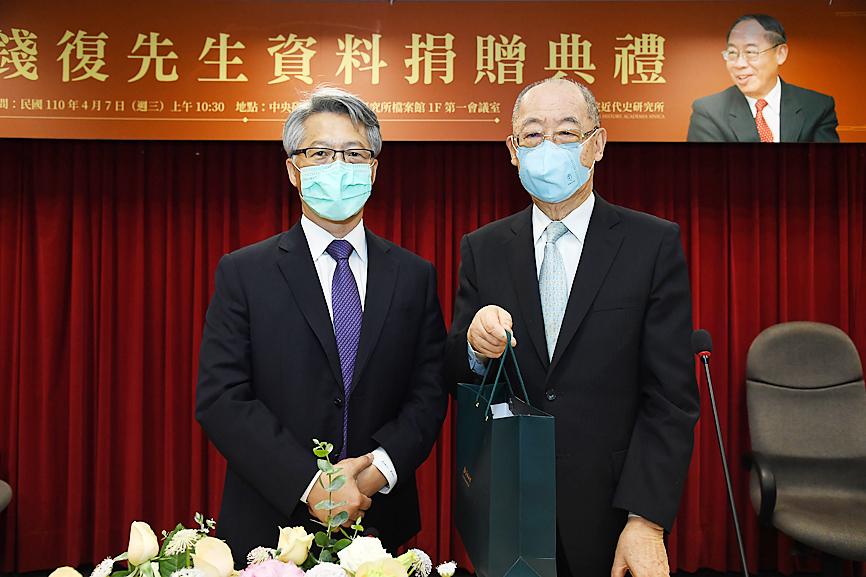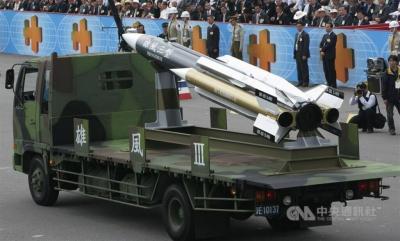Academia Sinica yesterday held a ceremony marking its reception of more than 200 boxes of historic documents from retired diplomat Frederick Chien (錢復), including documents formalizing the severing of diplomatic ties between Taipei and Washington.
Chien, 86, is the chairman of the Chiang Ching-kuo Foundation for International Scholarly Exchange.
He served in government positions from the 1960s to 2005, with his key postings including Executive Yuan government information office director, representative to the US, minister of foreign affairs and Control Yuan president.

Photo courtesy of Academia Sinica via CNA
Among his collection are the documents formalizing the Republic of China’s withdrawal from the UN in 1971 and Washington’s severing of ties with Taipei in 1979, as well as his correspondence with foreign dignitaries.
He has been preserving important documents and keeping a diary as instructed by his mentors Hu Shih (胡適) and Fu Ssu-nien (傅斯年), Chien told the ceremony at Academia Sinica’s Institute of Modern History in Taipei.
The Hoover Institution at Stanford University had expressed a desire to preserve the documents, but he was reluctant, he said.
“I am Chinese, and I do not want my documents to end up in foreign institutions,” Chien said.
After the last volume of his three-book memoir was published last year, he decided to donate the documents to the institute, as it has a good reputation of preserving documents physically and digitally, and because he once wanted to work there, he said.
Some documents were displayed on the sidelines of the ceremony, including a photograph from a meeting between then-representative to the US Chien and then-US president Ronald Reagan in 1984, after Washington switched recognition from Taipei to Beijing.
While the institute received many files from the Ministry of Foreign Affairs, Chien’s donation would be like “adding wings to a tiger” with respect to its research capabilities, said Academia Sinica Vice President Huang Chin-shing (黃進興), a historian.
The collection contains crucial materials that government officials should refer to, Huang said.
The institute is categorizing the documents donated by Chien and hopes to make them accessible for readers worldwide soon, said institute director Lu Miaw-fen (呂妙芬), who exchanged contracts with Chien marking the donation.
Chien’s father, Chien Shih-liang (錢思亮), was a former president of Academia Sinica, and his brother Chien Shu (錢煦) was the founding director of its Institute of Biomedical Sciences, showing the family’s profound ties to the academy, Academia Sinica President James Liao (廖俊智) said.
Presidential Office Secretary-General David Lee (李大維), and retired diplomats Chen Chien-jen (程建人), Shen Lyu-shun (沈呂巡) and Francisco Ou (歐鴻鍊) also attended the event.

STATS: Taiwan’s average life expectancy of 80.77 years was lower than that of Japan, Singapore and South Korea, but higher than in China, Malaysia and Indonesia Taiwan’s average life expectancy last year increased to 80.77 years, but was still not back to its pre-COVID-19 pandemic peak of 81.32 years in 2020, the Ministry of the Interior said yesterday. The average life expectancy last year increased the 0.54 years from 2023, the ministry said in a statement. For men and women, the average life expectancy last year was 77.42 years and 84.30 years respectively, up 0.48 years and 0.56 years from the previous year. Taiwan’s average life expectancy peaked at 81.32 years in 2020, as the nation was relatively unaffected by the pandemic that year. The metric

Taiwan High Speed Rail Corp. (THSRC) plans to ease strained capacity during peak hours by introducing new fare rules restricting passengers traveling without reserved seats in 2026, company Chairman Shih Che (史哲) said Wednesday. THSRC needs to tackle its capacity issue because there have been several occasions where passengers holding tickets with reserved seats did not make it onto their train in stations packed with individuals traveling without a reserved seat, Shih told reporters in a joint interview in Taipei. Non-reserved seats allow travelers maximum flexibility, but it has led to issues relating to quality of service and safety concerns, especially during

A magnitude 5.1 earthquake struck Chiayi County at 4:37pm today, the Central Weather Administration (CWA) said. The hypocenter was 36.3km southeast of Chiayi County Hall at a depth of 10.4km, CWA data showed. There were no immediate reports of damage resulting from the quake. The intensity of the quake, which gauges the actual effect of a seismic event, measured 4 in Chiayi County, Tainan and Kaohsiung on Taiwan's seven-tier intensity scale, the data showed. The quake had an intensity of 3 in Chiayi City and Yunlin County, while it was measured as 2 in Pingtung, Taitung, Hualien, Changhua, Nantou and Penghu counties, the data

The Supreme Court today rejected an appeal filed by former Air Force officer Shih Chun-cheng (史濬程), convicted of Chinese Communist Party (CCP) espionage, finalizing his sentence at two years and two months for contravening the National Security Act (國家安全法). His other ruling, a ten-month sentence for an additional contravention, was meanwhile overturned and sent to the Taichung branch of the High Court for retrial, the Supreme Court said today. Prosecutors have been notified as Shih is considered a flight risk. Shih was recruited by Chinese Communist Party (CCP) intelligence officials after his retirement in 2008 and appointed as a supervisor